2008年全国统一高考英语试卷(全国卷Ⅰ)(含解析版)
- 格式:doc
- 大小:457.71 KB
- 文档页数:39
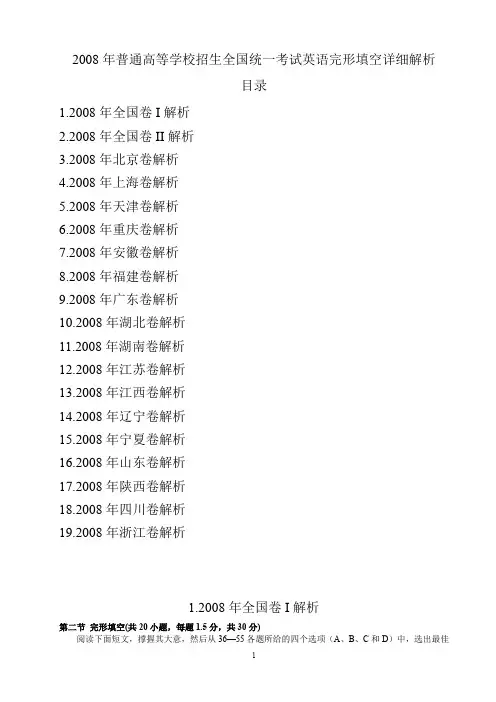
2008年普通高等学校招生全国统一考试英语完形填空详细解析目录1.2008年全国卷I解析2.2008年全国卷II解析3.2008年北京卷解析4.2008年上海卷解析5.2008年天津卷解析6.2008年重庆卷解析7.2008年安徽卷解析8.2008年福建卷解析9.2008年广东卷解析10.2008年湖北卷解析11.2008年湖南卷解析12.2008年江苏卷解析13.2008年江西卷解析14.2008年辽宁卷解析15.2008年宁夏卷解析16.2008年山东卷解析17.2008年陕西卷解析18.2008年四川卷解析19.2008年浙江卷解析1.2008年全国卷I解析第二节完形填空(共20小题,每题1.5分,共30分)阅读下面短文,撑握其大意,然后从36—55各题所给的四个选项(A、B、C和D)中,选出最佳选项,并在答题卡上将该项涂黑。
After the birth of my second child, I got a job at a restaurant. Having worked with an experienced 36 for a few days, I was 37 to wait tables on my own. All went 38 that first week. When Saturday night came, I was luckily 39 the tables not far from the kitchen. 40 , I still felt a little hard to carry the heavy trays (托盘)。
Before I knew it, the 41 was full of people. I moved slowly, 42 every step. I remember how 43 I was when I saw the tray stand near the tables, it looked different from the one I was 44 on. It had nice handles (手柄),which made it 45 to move around. I was pleased with everything and began to 46 I was a natural at this job.Then, an old man came to me and said, “Excuse me, dear, my wife and I loved __47 you work. It seems your tray stand has been very 48 to you, but we are getting ready to 49 now, and my wife needs her 50 back.”At first his 51 did not get across. “What was he talking about!” Then I got it. I had set my trays on his wi fe’s orthopedic walker (助步器). I stood frozen as ice, but my face was 52 . I wanted to get into a hole and 53 .Since then, I have learned from many mistakes such as the one I just 54 , I have learned to be more 55 and not to be too sure of myself.36. A. manager B. assistant C. cook D. waitress【答案】D。
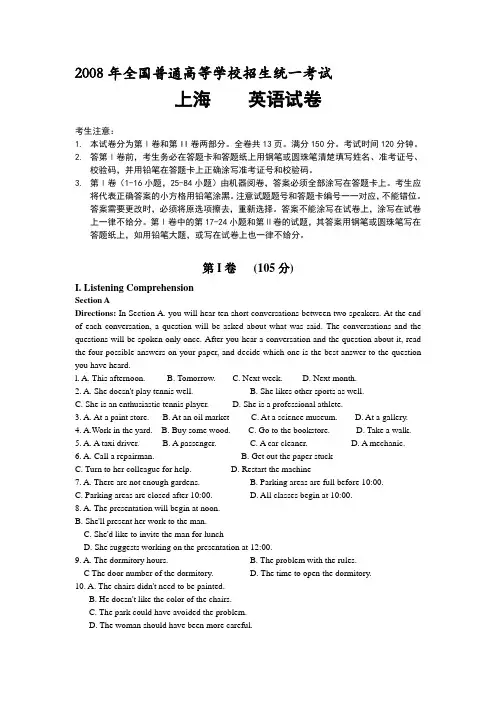
2008年全国普通高等学校招生统一考试上海英语试卷考生注意:1.本试卷分为第Ⅰ卷和第II卷两部分。
全卷共13页。
满分150分。
考试时间120分钟。
2.答第Ⅰ卷前,考生务必在答题卡和答题纸上用钢笔或圆珠笔清楚填写姓名、准考证号、校验码,并用铅笔在答题卡上正确涂写准考证号和校验码。
3.第Ⅰ卷(1-16小题,25-84小题)由机器阅卷,答案必须全部涂写在答题卡上。
考生应将代表正确答案的小方格用铅笔涂黑。
注意试题题号和答题卡编号一一对应,不能错位。
答案需要更改时,必须将原选项擦去,重新选择。
答案不能涂写在试卷上,涂写在试卷上一律不给分。
第Ⅰ卷中的第17-24小题和第Ⅱ卷的试题,其答案用钢笔或圆珠笔写在答题纸上,如用铅笔大题,或写在试卷上也一律不给分。
第I卷(105分)I. Listening ComprehensionSection ADirections: In Section A. you will hear ten short conversations between two speakers. At the end of each conversation, a question will be asked about what was said. The conversations and the questions will be spoken only once. After you hear a conversation and the question about it, read the four possible answers on your paper, and decide which one is the best answer to the question you have heard.l. A. This afternoon. B. Tomorrow. C. Next week. D. Next month.2. A. She doesn't play tennis well. B. She likes other sports as well.C. She is an enthusiastic tennis player.D. She is a professional athlete.3. A. At a paint store. B. At an oil market C. At a science museum. D. At a gallery.4. A.Work in the yard. B. Buy some wood. C. Go to the bookstore. D. Take a walk.5. A. A taxi driver. B. A passenger. C. A car cleaner. D. A mechanic.6. A. Call a repairman. B. Get out the paper stuckC. Turn to her colleague for help.D. Restart the machine7. A. There are not enough gardens. B. Parking areas are full before 10:00.C. Parking areas are closed after 10:00.D. All classes begin at 10:00.8. A. The presentation will begin at noon.B. She'll present her work to the man.C. She'd like to invite the man for lunchD. She suggests working on the presentation at 12:00.9. A. The dormitory hours. B. The problem with the rules.C The door number of the dormitory. D. The time to open the dormitory.10. A. The chairs didn't need to be painted.B. He doesn't like the color of the chairs.C. The park could have avoided the problem.D. The woman should have been more careful.Section BDirections: In Section B. you will hear two short passages, and you will be asked three questions on each of the passages. The passages will be read twice, but the questions will be spoken only once. When you hear a question, read the four possible answers on your paper and decide which one would be the best answer to the question you have heard.Questions 11 through 13 are based on the following passage11. A. Worried. B. Surprised. C. Satisfied. D. Uninterested.12. A. It spoiled Juana's reputation. B. It copied her ideas without permission.C. It bought Juana's dishwashers.D. It wanted to share the dishwasher market.13. A. A successful business case. B. Juana's waterless laundry.C. A case against a global company.D. The worldwide dishwasher market. Questions 14 through 16 are based on the following instructions.14. A. footprints. B. Food. C. Living insects. D. Orange seeds.15. A. Don't touch animals under any circumstances.B. Don't take away any natural objects from the park.C. Don't leave litter in the park or throw any off the boat.D. Don't transport animals from one island to another.16. A. To protect the guide's interest. B. To improve the unique environment.C. To ensure a trouble-free visit.D. To get rid of illegal behaviours.Section CDirections: In Section C, you will bear two longer conversations. The conversations will be read twice. After you hear each conversation, you are required to fill in the numbered blanks with the information you have heard. Write your answers on your answer sheet.Complete the form. Write ONE WORD for each answer.Complete the form. Write NO MORE THAN THREE WORDS for each answer.II. Grammar and VocabularySection ADirections: Beneath each of the following sentences there are four choices marked A, B. C and D. Choose the one answer that best completes the sentence.25. The two sportsmen congratulated each other ______ winning the match by shaking hands.A. withB. onC. inD. to26. — Do you want tea or coffee?—______. I really don't mind.A. NoneB. NeitherC. EitherD. All27. In my view, London's not as expensive in price as Tokyo but Tokyo is ______in traffic.A. the most organizedB. more organizedC. so organized asD. as organized as28. — Do you know if Terry will go camping this weekend?—Terry? Never! She ______tents and fresh air!A. has hatedB. hatedC. will hateD. bates29. According to the air traffic rules, you ______switch off your mobile phone before bearding.A. mayB. canC. wouldD. should30. My sister, an inexperienced rider, was found sitting on the bicycle ______to balance it.A. having triedB. tryingC. to tryD. tried31. — Are you ready for Spain?— Yes. 1 want the girls to experience that ______they are young.A. whileB. untilC. ifD. before32. In recent years many football clubs ______as business to make a profit.A. have runB. have been run C had been run D. will run33. If there's a lot of work______. I'm happy to just keep on until it is finished.A. to doB. to be doingC. doneD. doing34. As his best friend. I can make accurate guesses about ______he will do or think.A. whatB. whichC. whomD. that35. Something as simple as ______some cold water may clear your mind and relieve pressure.A. to drinkB. drinking C to be drinking D. drunk36. It has been proved ______eating vegetables in childhood helps to protect you against serious illnesses in later life.A. ifB. becauseC. whenD. that37. Ideally ______for Broadway theatres and Firth Avenue, the New York Park hotel is a favourite with many guests.A. locatingB. being locatedC. having been locatedD. located38. We went through a period ______communications were very difficult in the rural areas.A. whichB. whoseC. in whichD. with which39. So much of interest ______that most visitors simply run out of time before seeing it all.A. offers BeijingB. Beijing offersC. does Beijing offerD. Beijing does offer40. ______well prepared you are, you still need a lot of luck in mountain climbing.A. HoweverB. WhateverC. No matterD. Although Section BDirections: Complete the following passage by using the words in the box. Each word can only be used once. Note that there is one word more than you need.Frederick Douglass was an escaped slave in the movement that fought to end slavery in the United Stales. He became a 41 vice in the yean before the Civil War.A few weeks ago, the National Park Service (NPS) _42_ Douglass's birth and Black History Month with the reopening of his home at Cedar Hill, a _43 site in Washington. D.C. The two-story house, which contains many of Douglass's personal possessions, had undergone a three-year _44 _. (Thanks to the NTS website, however, you don't have to live in the nation's capital to visit it. Take a tour online.)He was born Frederick Augustus Washington Bailey to a slave mother and a white father he never knew. Douglass grew up to become the first black _45 to bold a government office — as US minister and consul general (总领事) to Haiti.As a youth, he never went to school. Educating slaves was illegal in the South, so he _46 taught himself to read and write. At 21 years old, he escaped from his slave owner to Massachusetts and changed his last name to Douglass, to hide his identity.In the 1850s, Douglass was involved with the Underground Railroad, the system _47 up by antislavery groups to bring runaway slaves to the North and Canada. His home in Rochester, N.Y. was near the Canadian border. It became an important station on the _48 , housing as many as 11 runaway slaves at a time.He died in 1895. In his lifetime, Douglass witnessed the end of slavery in 1865 and the adoption of the 15th Amendment to the US Constitution (美国宪法修正案), which _49 African-Americans the right to vote.III. Reading ComprehensionSection ADirections: For each blank in the following passage there are four words or phrases marked A, B, C and D. Fill in each blank with the word or phrase that best fits the context.People think children should play sports. Sports are fun, and playing with others. However, playing sports can have __50 effects on children. It may produce feelings of poor self-respect or aggressive behavior in some children. According to research on kids and sports, 40,000,000 kids play sports in the US. Of these, 18,000,000 say they have been __51 at or called names while playing sports. This leaves many children with a bad __52 of sports. They think sports are just too aggressive.Many researchers believe adults, especially parents and coaches, are the main _53 of too much aggression ill children's sports. They believe children _54 _ aggressive adult behavior. This behavior is then further strengthened through both positive and negative feedback. Parents and coaches are powerful teachers because children usually look up to them. Often these adults behave aggressively themselves, sending children the message that__55 is everything. Many parents go to children's sporting events and shout __56 _ at other players or cheer when their child behaves __57__. As well, children arc even taught that hurting other players is _ 58 or are pushed to continue playing even when they are injured. _59 , the media makes violence seem exciting. Children watch adult sports games and see violent behavior replayed over and over on television.As a society, we really need to 60 this problem and do something about it. Parents and coaches _61 should act as better examples for children. They also need to teach children better__62 . They should not just cheer when children win or act aggressively. They shouldteach children to __63 _ themselves whether they win or not. Besides, children should not be allowed to continue to play when they are injured. If adults allow children to play when injured, this gives the message that __64 is not as important as winning.50. A. restrictive B. negative C. active D. instructive51. A. knocked B. glanced C. smiled D. shouted52. A. impression B. concept C. taste D. expectation53. A. resource B. cause C. course D. consequence54. A. question B. understand C. copy D. neglect55. A. winning B. practising C. fun D. sport56. A. praises B. orders C. remarks D. insults57. A. proudly B. ambitiously C. aggressively D. bravely58. A. acceptable B. impolite C. possible D. accessible59. A. By contrast B. In addition C. As a result D. After all60. A. look up to B. face up to C. make up for D. come up with61. A. in particular B. in all C. in return D. in advance62. A. techniques B. means C. values D. directions63. A. respect B. relax C. forgive D. enjoy64. A. body B. fame C. health D. spiritSection BDirections: Read the following four passages. Each passage is followed by several questions or unfinished statements. For each of them there are four choices marked A, B, C and D. Choose the one that fits best according to the information given in the passage you have just read.(A)ASK LASKAS YOU’VEGOT QUESTIONS, SHE'S GOT ANSWERSMy children go to a primary school where they are notallowed to play football in the playground for fear that a childmight be hurt. Besides, now the school says there must be nohomework because the local secondary school can't keep up with theamount of homework given in the primary school. Can the school dothis? Puzzled DadIt can't if enough parents do something about it. It is not justschools. We live in a society which wishes to get rid of risk.However, schools should have a little common sense andcourage. Children need risk if they arc to grow up self-sufficient and confident. They need homework, too, if they are to fulfill their academic potential. Complain, loudly.I have a beautiful teenage daughter who spends an hour making up her face in front of the mirror every day. I tell her to go easy. She just gets mad or bursts into tears. How can Imake her understand she's beautiful the way she is. Plain MomYou can't. Your daughter is at the age when she's trying to look beautiful, trying on new masks. And if her friends all dress up as she does, you're in for an extra hard time.Support her and tell her she's beautiful — even if she looks ridiculous for now.Theninvite her to join you for a day at a spa(健康美容中心). Let her try various looks until she's comfortable in her own skin.65. Why are the children not allowed to play football in the playground?A. The school is afraid that children might be injured.B. The school is not sensible and confident.C. The children don't have enough time to do homework.D. The children may fail to fulfill their academic potential.66. What disturbs Plain Mom is that her daughter______.A. becomes madB. cries a lotC. spends much time before the mirrorD. is not beautiful enough67. The solution to Plain Mom's problem is to______.A. make her daughter look less ridiculousB. let her daughter dress up like her friendsC. make her daughter go to a spa every weekD. let her daughter feel herself what beauty is(B)Zoe Chambers was a successful PR (Public Relations) consultant and life was going well —she had a great job, a beautiful flat and a busy social life in London. Then one evening in June last year, she received a text message telling her she was out of work. The first two weeks were the most difficult to live through." she said. "After everything I'd done for the company, they dismissed me by text! I was so angry and I just didn't feel like looking for another job. I hated everything about the city and my life."Then, Zoe received an invitation from an old school friend, Kathy, to come and stay. Kathy and her husband, Huw, had just bought a farm in north-west Wales. Zoe jumped at the chance to spend a weekend away from London, and now, ten months later, she is still on the farm."The moment I arrived at Kathy's farm, I loved it and I knew I wanted to stay." said Zoe. "Everything about my past life suddenly seemed meaningless."Zoe has been working on the farm since October of last year and says she has no regrets. "It's a hard life, physically very tiring." she says. "In London 1 was stressed and often mentally exhausted. But this is a good, healthy tiredness. Here, all 1 need to put me in a good mood is a hot bath and one of Kathy's wonderful dinners."Zoe says she has never felt bored on the farm. Every day brings a new experience. Kathy has been leaching her how to ride a horse and she has learnt to drive a tractor. Since Christmas, she has been helping with the lambing — watching a lamb being born is unbelievable, she says, "It's one of the most moving experiences I've ever had. I could never go back to city life now."68. When working as a PR consultant in London, Zoe thought she lived a ______life.A. satisfyingB. toughC. meaninglessD. boring69. The most important reason why Zoe went to visit Kathy's farm is that______.A. Zoe lost her job as a PR consultantB. Kathy persuaded her to do soC. Zoe got tired of the city lifeD. Zoe loved Wales more than London70. How does Zoe feel about the country life according to the passage?A. Tiresome and troublesome.B. Romantic and peacefulC. Mentally exhausting but healthyD. Physically tiring but rewarding.71. Which of the following is closest to the main idea of the passage?A. A friend in need is a friend indeed.B. Where there is a will, there is a way.C. A misfortune may turn out a blessing.D. Kill two birds with one stone.(C)A study involving 8,500 teenagers from all social backgrounds found that most of them are ignorant when it comes to money. The findings, the first in a series of reports from NatWest that has started a five-year research project into teenagers and money, arc particularly worrying as this generation of young people is likely to be burdened with greater debts man any before.University tuition fees (学费)are currently capped at £3,000 annually, but this will be reviewed next year and the Government is under enormous pressure to raise the ceiling.In the research, the teenagers were presented with die terms of four different loans but 76 per cent failed to identify the cheapest. The young people also predicted that they would be earning on average £31.000 by the age of 25, although the average salary for those aged 22 to 29 is just £ 17,815. The teenagers expected to be in debt when they finished university or training, although half said that they assumed the debts would be less than £ 10.000. Average debts for graduates are £ 12,363.Stephen Moir, head of community investment at the Royal Bank of Scotland Group which owns NatWest, said. "The more exposed young people are to financial issues, and the younger they become aware of them, the more likely they arc to become responsible, forward-planning adults who manage their finances confidently and effectively."Ministers are deeply concerned about the financial pressures on teenagers and young people because of student loans and rising housing costs. They have just introduced new lessons in how to manage debts. Nikki Fairweather, aged 15, from St Helens, said that she had benefited from lessons on personal finance, but admitted that she still had a lot to learn about money.72. Which of the following can be found from the five-year research project?A. Students understand personal finances differently.B. University tuition fees in England have been rising.C. Teenagers tend to overestimate their future earnings.D. The students' payback ability has become a major issue.73. The phrase "to raise the ceiling" in paragraph 2 probably means "______".A. to raise the student loansB. to improve the school facilitiesC. to increase the upper limit of the tuitionD. to lift the school building roofs74. According to Stephen Moir, students_______.A. are too young to be exposed to financial issuesB. should learn to manage their finances wellC. should maintain a positive attitude when facing loansD. benefit a lot from lessons on personal finance75. What can we learn from the passage?A. Many British teenagers do not know money matters wellB. Teenagers in Britain are heavily burdened with debts.C. Financial planning is a required course at college.D. Young people should become responsible adults.(D)The world economy has run into a brick wall. Despite countless warnings in recent years about the need to address a potential hunger crisis in poor countries and an energy crisis worldwide, world leaders failed to think ahead. The result is a global food crisis. Wheat, corn and rice prices have more than doubled in the past two years. And oil prices have increased more than three times since the start of 2004. These food-price increases, combined with increasing energy costs, will slow if not stop economic growth in many parts of the world and will even affect political stability. Practical solutions to these problems do exist, but we'll have to start thinking ahead and acting globally.Here are three steps to ease the current food crisis and avoid the potential for a global crisis. The first is to promote the dramatic success of Malawi, a country in southern Africa, which three years ago established a special fund to help its farmers get fertilizer and seeds with high productivity. Malawi’s harvest doubled after just one year. An international fund based on the Malawi model would cost a mere $10 per person annually in the rich world, or S10 billion altogether.Second, the U.S. and Europe should abandon their policies of paying partly for the change of food into biofuels. The U.S. government gives farmers a taxpayer-financed payment of 51 cents per gallon of ethanol (乙醇) changed from corn. There may be a case for biofuels produced on lands that do not produce foods — tree crops, grasses and wood products — but there's no case for the government to pay to put the world's dinner into the gas tank.Third, we urgently need to weather-proof die world's crops as soon and as effectively as possible. For a poor farmer, sometimes something as simple as a farm pond —which collects rainwater to be used in dry weather — can make the difference between a good harvest and a bad one. The world has already committed to establishing a Climate Adaptation hind to help poor regions climate-proof vital economic activities such as food production and health care but has not yet acted upon the promise.76. An international fund based on the Malawi model would______.A. cost each of the developed countries $10 billion per yearB. aim to double the harvest in southern African countries in a yearC. decrease the food prices as well as the energy pricesD. give poor farmers access to fertilizer and highly productive seeds77. With the second step, the author expresses the idea that ______.A. it is not wise to change food crops into gasB. it is misleading to put tree crops into the gas tankC. we should get alternative forms of fuel in any wayD. biofuels should be developed on a large scale78. Which of the following is true according to the passage?A. A rain-collecting pond is a simple safeguard against dry weather.B. A Climate Adaptation Fund has been established to help poor regions.C. The world has made a serious promise to build farm ponds.D. It makes a great difference whether we develop wood products or not.79. In the passage, the author calls on us to______.A. slow down but not to stop economic growthB. develop tree crops, grasses and wood productsC. achieve economic growth and political stabilityD. act now so as to relieve the global food shortageSection CDirections: Read the following text and choose the most suitable heading from A-F for each paragraph. There is one extra heading which you do not need.80.The causes of eating disorders are not clear. There may be genetic or biochemical factors in some cases. There may be psychological problems from early childhood or the present (such as school or family conflicts) that trigger the problem. Often, there is the double pressure to enjoy life through food and yet remain ultra-slim. Society all around us encourages eating and drinking as main ways to enjoy life- To be popular, you are supposed to eat, eat, eat.81. But in real life most people, if they keep consuming like that, just keep pulling on more and more weight They then find themselves in conflict with another dominant pressure in society — to stay slim and trim. Models in ads, even those shown eating fairy foods, are usually physically lit and quite thin. All of these pressures put teens in a terrible situation. The ".solution" that some teens choose is to deny themselves all the time so as to keep temptation away. Bui soon, hunger and food boredom lead to overeating. Over time they develop anorexia or bulimia.82. Once an eating disorder has become firmly established, there is no easy cure. Someone who's never suffered anorexia and never known an anorexic might be tempted to think. "It's simple — just tell them to eat more!" Unfortunately, it's not that simple. Even when anorexics have been brought into the hospital and arc receiving physical care, nutritional therapy, and psychiatric care, many don't improve much.83. Our society's obsession with thinness, together with a constant emphasis on the theme thatrich food means pleasure, puts many teens in a difficult situation. Being drawn to overeating on the one hand and self-denial on the other can bring about anorexia or bulimia —or both. Anorexics seem to feel that no matter how much weight they lose, they are still too fat Therefore, it is important for each person in our society to try to maintain a healthy and realistic self-image. Don't compare yourself with the models and actors in the media Set your sights more realistically by comparing yourself with family and friends, if anyone.84.Self-denial is the typical first step toward an caring disorder. Eventually, desires for what you've denied yourself become unbearable, and you react with either a binge or overly fierce self-control. The answer is not of course, to eat all the snacks and treats you fancy. But 10 avoid that first step that leads to overeating, strive for a good and healthy diet. Such a diet is based primarily on grain products, fruits, and vegetables, with moderate amounts of meat and dairy products and with small amounts of snacks and desserts. Research demonstrates that mis kind of diet leaves you more alert and energetic.第Ⅱ卷(45分)I. TranslationDirections: Translate the following sentences into English, using the words given in the brackets.1. 我们打篮球的时间到了。
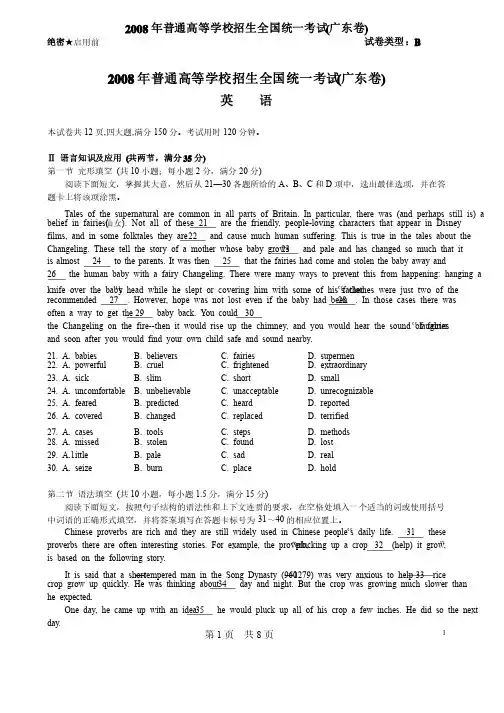
2008年普通高等学校招生全国统一考试(广东卷)第1页共8页1 绝密★启用前试卷类型:B2008年普通高等学校招生全国统一考试(广东卷)英语本试卷共12页,四大题,满分150分。
考试用时120分钟。
Ⅱ语言知识及应用(共两节,满分35分)第一节完形填空(共10小题;每小题2分,满分20分) 阅读下面短文,掌握其大意,然后从2121——30各题所给的A 、B 、C 和D 项中,选出最佳选项,并在答题卡上将该项涂黑。
Tales of the supernatural are common in all parts of Britain. In particular, there was (and perhaps still is) a belief in fairies(仙女). Not all of these ). Not all of these 21 21 are the friendly, people-loving characters that appear in Disney films, and in some folktales they are 22 22 and cause much human suffering. This is true in the tales about the Changeling. These tell the story of a mother whose baby grows 23 and pale and has changed so much that it is is almost almost 24 to to the the the parents. parents. parents. It It It was was was then then 25 that that the the the fairies fairies fairies had had had come come come and and and stolen stolen stolen the the the baby baby baby away away away and and 26 the human baby with a fairy Changeling. There were many ways to prevent this from happening: hanging a knife over the baby ‟s head while he slept or covering him with some of his father ‟s clothes were just two of the recommended 27 . However, hope was not lost even if the baby had been 28 . In those cases there was often a way to get the 29 baby back. You could 30 the Changeling on the fire--then it would rise up the chimney, and you would hear the sound of fairies ‟ laughter and soon after you would find your own child safe and sound nearby. 21. A. babies B. believers C. fairies D. supermen 22. A. powerful B. cruel C. frightened D. extraordinary 23. A. sick B. slim C. short D. small 24. A. uncomfortable B. unbelievable C. unacceptable D. unrecognizable 25. A. feared B. predicted C. heard D. reported 26. A. covered B. changed C. replaced D. terrified 27. A. cases B. tools C. steps D. methods 28. A. missed B. stolen C. found D. lost 29. A.1ittle B. pale C. sad D. real 30. A. seize B. burn C. place D. hold 第二节语法填空(共10小题,每小题1.5分,满分15分) 阅读下面短文,按照句子结构的语法性和上下文连贯的要求,在空格处填入一个适当的词或使用括号中词语的正确形式填空,并将答案填写在答题卡标号为31~40的相应位置上。
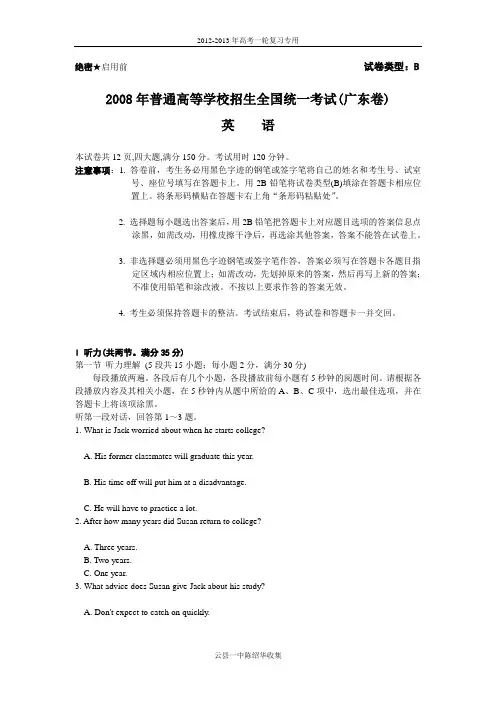
绝密★启用前试卷类型:B 2008年普通高等学校招生全国统一考试(广东卷)英语本试卷共12页,四大题,满分150分。
考试用时120分钟。
注意事项:1. 答卷前,考生务必用黑色字迹的钢笔或签字笔将自己的姓名和考生号、试室号、座位号填写在答题卡上。
用2B铅笔将试卷类型(B)填涂在答题卡相应位置上。
将条形码横贴在答题卡右上角“条形码粘贴处”。
2. 选择题每小题选出答案后,用2B铅笔把答题卡上对应题目选项的答案信息点涂黑,如需改动,用橡皮擦干净后,再选涂其他答案,答案不能答在试卷上。
3. 非选择题必须用黑色字迹钢笔或签字笔作答,答案必须写在答题卡各题目指定区域内相应位置上;如需改动,先划掉原来的答案,然后再写上新的答案;不准使用铅笔和涂改液。
不按以上要求作答的答案无效。
4. 考生必须保持答题卡的整洁。
考试结束后,将试卷和答题卡一并交回。
I 听力(共两节。
满分35分)第一节听力理解(5段共15小题;每小题2分,满分30分)每段播放两遍。
各段后有几个小题,各段播放前每小题有5秒钟的阅题时间。
请根据各段播放内容及其相关小题,在5秒钟内从题中所给的A、B、C项中,选出最佳选项,并在答题卡上将该项涂黑。
听第一段对话,回答第1~3题。
1. What is Jack worried about when he starts college?A. His former classmates will graduate this year.B. His time off will put him at a disadvantage.C. He will have to practice a lot.2. After how many years did Susan return to college?A. Three years.B. Two years.C. One year.3. What advice does Susan give Jack about his study?A. Don't expect to catch on quickly.B. Don't take the English major.C. Don't take too many courses.听第二段对话,回答第4~6题。
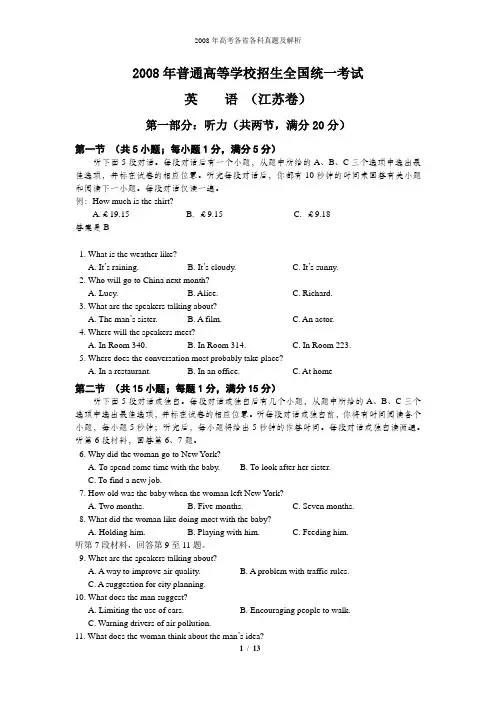
2008年普通高等学校招生全国统一考试英语(江苏卷)第一部分:听力(共两节,满分20分)第一节(共5小题;每小题1分,满分5分)听下面5段对话。
每段对话后有一个小题,从题中所给的A、B、C三个选项中选出最佳选项,并标在试卷的相应位置。
听完每段对话后,你都有10秒钟的时间来回答有关小题和阅读下一小题。
每段对话仅读一遍。
例:How much is the shirt?A.£19.15B. £9.15C. £9.18答案是B1. What is the weather like?A. It’s raining.B. It’s cloudy.C. It’s sunny.2. Who will go to China next month?A. Lucy.B. Alice.C. Richard.3. What are the speakers talking about?A. The man’s sister.B. A film.C. An actor.4. Where will the speakers meet?A. In Room 340.B. In Room 314.C. In Room 223.5. Where does the conversation most probably take place?A. In a restaurant.B. In an office.C. At home第二节(共15小题;每题1分,满分15分)听下面5段对话或独白。
每段对话或独白后有几个小题,从题中所给的A、B、C三个选项中选出最佳选项,并标在试卷的相应位置。
听每段对话或独白前,你将有时间阅读各个小题,每小题5秒钟;听完后,每小题将给出5秒钟的作答时间。
每段对话或独白读两遍。
听第6段材料,回答第6、7题。
6. Why did the woman go to New York?A. To spend some time with the baby.B. To look after her sister.C. To find a new job.7. How old was the baby when the woman left New York?A. Two months.B. Five months.C. Seven months.8. What did the woman like doing most with the baby?A. Holding him.B. Playing with him.C. Feeding him.听第7段材料,回答第9至11题。
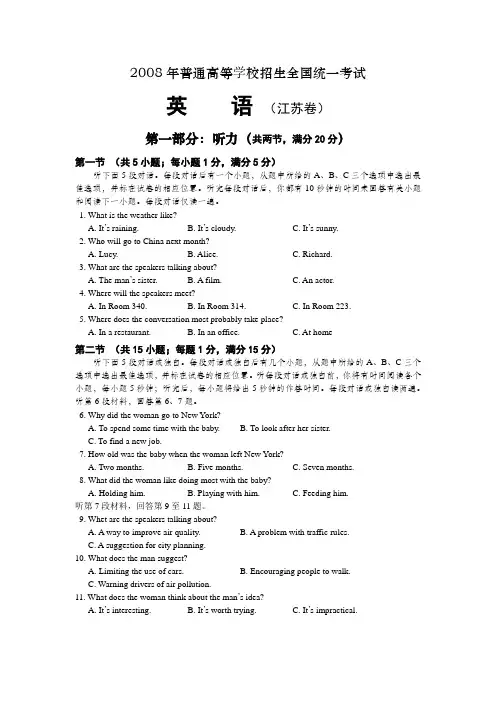
2008年普通高等学校招生全国统一考试英语(江苏卷)第一部分:听力(共两节,满分20分)第一节(共5小题;每小题1分,满分5分)听下面5段对话。
每段对话后有一个小题,从题中所给的A、B、C三个选项中选出最佳选项,并标在试卷的相应位置。
听完每段对话后,你都有10秒钟的时间来回答有关小题和阅读下一小题。
每段对话仅读一遍。
1. What is the weather like?A. It’s raining.B. It’s cloudy.C. It’s sunny.2. Who will go to China next month?A. Lucy.B. Alice.C. Richard.3. What are the speakers talking about?A. The man’s sister.B. A film.C. An actor.4. Where will the speakers meet?A. In Room 340.B. In Room 314.C. In Room 223.5. Where does the conversation most probably take place?A. In a restaurant.B. In an office.C. At home第二节(共15小题;每题1分,满分15分)听下面5段对话或独白。
每段对话或独白后有几个小题,从题中所给的A、B、C三个选项中选出最佳选项,并标在试卷的相应位置。
听每段对话或独白前,你将有时间阅读各个小题,每小题5秒钟;听完后,每小题将给出5秒钟的作答时间。
每段对话或独白读两遍。
听第6段材料,回答第6、7题。
6. Why did the woman go to New York?A. To spend some time with the baby.B. To look after her sister.C. To find a new job.7. How old was the baby when the woman left New York?A. Two months.B. Five months.C. Seven months.8. What did the woman like doing most with the baby?A. Holding him.B. Playing with him.C. Feeding him.听第7段材料,回答第9至11题。
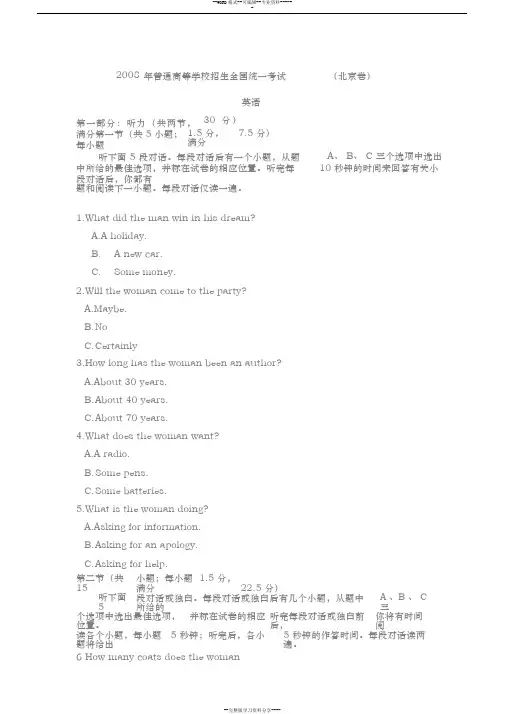
2008 年普通高等学校招生全国统一考试(北京卷)英语第一部分:听力(共两节,满分第一节(共 5 小题;每小题30 分)1.5 分,满分7.5 分)听下面 5 段对话。
每段对话后有一个小题,从题中所给的最佳选项,并标在试卷的相应位置。
听完每段对话后,你都有A、 B、 C 三个选项中选出10 秒钟的时间来回答有关小题和阅读下一小题。
每段对话仅读一遍。
1.W hat did the man win in his dream?A.A holiday.B. A new car.C.Some money.2.W ill the woman come to the party?A.Maybe.B.N oC.C ertainly3.H ow long has the woman been an author?A.About 30 years.B.A bout 40 years.C.A bout 70 years.4.W hat does the woman want?A.A radio.B.S ome pens.C.S ome batteries.5.W hat is the woman doing?A.Asking for information.B.A sking for an apology.C.A sking for help.第二节(共15 小题;每小题 1.5 分,满分22.5 分)听下面5 段对话或独白。
每段对话或独白后有几个小题,从题中所给的A 、B 、 C三个选项中选出最佳选项,并标在试卷的相应位置。
听完每段对话或独白前后,你将有时间阅读各个小题,每小题 5 秒钟;听完后,各小题将给出5 秒钟的作答时间。
每段对话读两遍。
6How many coats does the woman. want?A. 25.B. 30.C. 50.7 . What is the order number forgloves?A. P25G5.B. P26T5.C. P28D5.听第 7 段材料,回答第 8、 9 题。
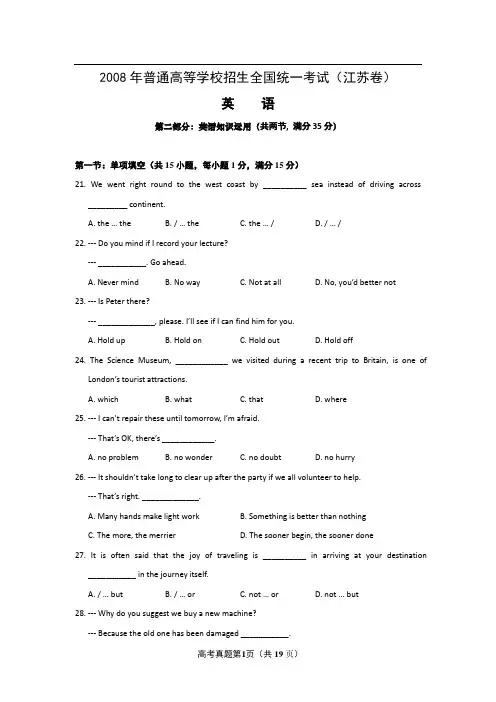
2008年普通高等学校招生全国统一考试(江苏卷)英语第二部分:英语知识运用(共两节, 满分35分)第一节:单项填空(共15小题,每小题1分,满分15分)21. We went right round to the west coast by __________ sea instead of driving across_________ continent.A. the … theB. / … theC. the … /D. / … /22. --- Do you mind if I record your lecture?--- ___________. Go ahead.A. Never mindB. No wayC. Not at allD. No, you’d better not23. --- Is Peter there?--- _____________, please. I’ll see if I can find him for you.A. Hold upB. Hold onC. Hold outD. Hold off24. The Science Museum, ____________ we visited during a recent trip to Britain, is one ofLondon’s tourist attractions.A. whichB. whatC. thatD. where25. --- I can’t repair these until tomorrow, I’m afraid.--- That’s OK, there’s ____________.A. no problemB. no wonderC. no doubtD. no hurry26. --- It shouldn’t take long to clear up after the party if we all volunteer to help.--- That’s right. _____________.A. Many hands make light workB. Something is better than nothingC. The more, the merrierD. The sooner begin, the sooner done27. It is often said that the joy of traveling is __________ in arriving at your destination___________ in the journey itself.A. / … butB. / … orC. not … orD. not … but28. --- Why do you suggest we buy a new machine?--- Because the old one has been damaged ___________.A. beyond reachB. beyond repairC. beyond controlD. beyond description29. --- They are quiet, aren’t they?--- Yes. They are accustomed ____________ at meals.A. to talkB. to not talkC. to talkingD. to not talking30. It is __________ to spend money on preventing illnesses by promoting healthy living ratherthan spending on trying to make people ___________ after they are ill.A. good … goodB. well … bette rC. better … betterD. better … good31. --- I’m still working on my project.--- Oh, you’ll miss the deadline. Time is ____________.A. running outB. going outC. giving outD. losing out32. __________ you eat the correct foods ___________ be able to keep fit and stay healthy.A. Only if; will youB. Only if; you willC. Unless; will youD. Unless; you will33. --- I’m sure Andrew will win the first prize in the final.--- I think so. He ___________ for it for months.A. is preparingB. was preparingC. had been preparingD. has been preparing34. To learn English well, we should find opportunities to hear English ___________ as much as wecan.A. speakB. speakingC. spokenD. to speak35. --- I’m sorry. I ___________ at you the o ther day.--- Forget it. I was a bit out of control myself.A. shouldn’t shoutB. shouldn’t have shoutedC. mustn’t shoutD. mustn’t have shouted第二节完型填空(共20小题;每小题1分,满分20分)Evelyn Glennie was the first lady of solo percussion in Scotland. In an interview, she recalled how she became a percussion soloist (打击乐器独奏演员) in spite of her disability.“Early on I decided not to allow the 36 of others to stop me from becoming a musician. Igrew up on a farm in northeast Scotland and began 37 piano lessons when I was eight. The older I got, the more my passion (酷爱) for music grew. But I also began to gradually lose my 38 . Doctors concluded that the nerve damage was the 39 and by age twelve, I was completely deaf. But my love for music never 40 me.“My 41 was to become a percussion soloist, even though there were none at that time. To perform, I 42 to hear music differently from others. I play in my stocking feet and can 43 the pitch of a note (音调高低) by the vibrations (振动). I feel through my body and through my 44 . My entire sound world exists by making use of almost every 45 that I have.“I was 46 to be assessed as a musician, not as a deaf musician, and I applied to the famous Royal Academy of Music in London. No other deaf student had 47 this before and some teachers 48 my admission. Based on my performance, I was 49 admitted and went to 50 with the academy’s highest honours.“After that, I established myself as the first full-time solo percussionist. I 51 and arranged a lot of musical compositions since 52 had been written specially for solo percussionists.“I have been a soloist for over ten years. 53 the doctor thought a was totally deaf, it didn’t 54 that my passion couldn’t be realized. I would encourage people not to allow themselves to be 55 by others. Follow your passion; follow your heart, they will lead you to to the place you want to go.”2008年的完形填空是一篇叙事性的文章,作者采用倒叙的手法,讲述了英国著名聋女乐器打击手Evelyn Glennie克服困难成功的故事,阐明了只要有激情,敢于尝试,就能成功的主题。
2008年全国统一高考英语试卷及解析(全国卷I)第一部分听力(共两节,满分30分)第一节(共5小题,每小题1.5分,满分7.5分)听下面5段对话,每段对话后有一个小题,从题中所给的A、B、C三个选项中选出最佳选项,并标在试卷的相应位置,听完每段对话后,你都有10秒钟时间来回答有关小题和阅读下一小题。
每段对话仅读一遍。
例:How much is the shirt?A. £19.15B. £9.15C. £9.18答案是B。
1. What is the weather like?A. It’s raining.B. It’s cloudy.2. Who will go to China next month?A. Lucy.B. Alice.C. Richard.3. What are the speakers talking about?A. The man’s sister.B. A film.C. An actor.4. Where will the speakers meet?A. In Room 340.B. In Room 314.C. In Room 223.5. Where does the conversation most probably take place?A. In a restaurant.B. In an office.C. At home.第二节(共15小题;每小题1.5分,满分22.5分)听下面5段对话或独白,每段对话或独白后面有几个小题,从题中所给的A、B、C三个选项中选出最佳选项,并标在试卷的相应位置。
听每段对话或独白前,你将有时间阅读各小题,每小题5秒钟;听完后,各小题将给出5秒钟的作答时间。
每段对话或独白读两遍。
听第6段材料,回答第6至8题。
6. Why did the woman go to New York?A. To spend some time with the baby.B. To look after her sister.C. To find a new job.7. How old was the baby when the woman left New York?A. Two months.B. Five months.C. Seven months.8. What did the woman like doing most with the baby?A. Holding him.B. Playing with him.C. Feeding him.听第7段材料,回答第9至11题。
9. What are the speakers talking about?A. A way to improve air quality.B. A problem with traffic rules.C. A suggestion for city planning.10. What does the man suggest?A. Limiting the use of cars.B. Encouraging people to walk.C. Warning drivers of air pollution.11. What does the woman think about the man’s idea?A. It’s interesting.B. It’s worth trying.C. It’s impractical.听第8段材料,回答第12至14小题。
12. How long will the man probably stay in New Zealand?A. One week.B. Two weeks.C. Three weeks.13. What advice does the woman give to the man?A. Go to New Zealand after Christmas.B. Book his flight as soon as possible.C. Save more money for his trip.14. What can we learn about flights to New Zealand at Christmas time?A. They require early booking.B. They can be twice as expensive.C. They are on special offer.听第9段材料,回答第15至17题。
15. Why did Jane call Mike?A. To ask him to meet her.B. To tell him about Tom.C. To borrow his car.16. Where will Jane be in about one hour?A. At Mike’s pla ce.B. At the airport.C. At a garage.17. What can we infer from the conversation?A Jane has just learned to drive.B. Jane’s car is in bad condition.C. Mike will go to the airport.听第10段材料,回答第18至20题。
18. What did the speaker ask the students to do the week before?A. Write a short story.B. Prepare for the lesson.C. Learn more about the writer.19. Why does the speaker ask the questions?A. To check the studen ts’ understanding of the story.B. To draw the students’ attention to reading skills.C. To let the students discuss father-son relationships.20. What will the students do in 10 minutes?A. Ask more questions.B. Discuss in groups.C. Give their answers.第二部分英语知识运用(共两节,满分45分)第一节单项填空(共15小题:每小题1分,满分15分)从A、B、C、D四个选项中,选出可以填入空白处的最佳选项,并在答题卡上将该项涂黑。
例:We ______ last night, but we went to the concert instead.A. must have studiedB. might studyC. should have studiedD. would study答案是C。
21. —Would you like to join me for a quick lunch before class?— ______, but I promised Nancy to go out with her.A. I’d like toB. I like it.C. I don’tD. Iwill22.—What fruit is in season now?—Pears and apples, ______.A. I knowB. I thinkC. I seeD. I feel23. The performance _______ nearly three hours, but few people left the theatre early.A. coveredB. reachedC. playedD. lasted24. Let’s learn to use the problem we are facing ________ a stepping-stone to future success.A. toB. forC. asD. by25. The lawyer seldom wears anything other than a suit __________the season.A. whateverB. whereverC. wheneverD. however26. I like getting up very early in summer. The morning air is so good _________.A. to be breathedB. to breatheC. breathingD. being breathed27. —Have you known Dr. Jackson for a long time?—Yes, since she________ the Chinese Society.A. has joinedB. joinsC. had joinedD. joined28. You are driving too fast. Can you drive_________?A. more slowly a bitB. slowly a bit moreC. a bit more slowlyD. slowly more bit29. The wet weather will continue tomorrow when a cold front ______ to arrive.A. is expectedB. is expectingC. expectsD. will be expected30. —Which of the two computer games did you prefer?—Actually I didn’t like ______.A. both of themB. either of themC. none of themD. neither of them31. —Have you got any idea for the summer vacation?—I don’t mind where we go ______ there’s sun, sea and beach.A. as ifB. as long asC. now thatD. in order that32. The weather was ______ cold that I didn’t like to leave my room.A. reallyB. suchC. tooD. so33. The English spoken in the United States is only slightly different from ______ spoken in England.A. whichB. whatC. thatD. the one34. After studying in a medical college for five years, Jane ______ her job as a doctor in the countryside.A. set outB. took overC. took upD. set up 35—Sorry, I made a mistake again.—______. Practice more and you’ll succeed.A. Never mindB. Certainly notC. Not at allD. Don’t mention it第二节完形填空(共20小题,每题1.5分,共30分)阅读下面短文,撑握其大意,然后从36—55各题所给的四个选项(A、B、C和D)中,选出最佳选项,并在答题卡上将该项涂黑。